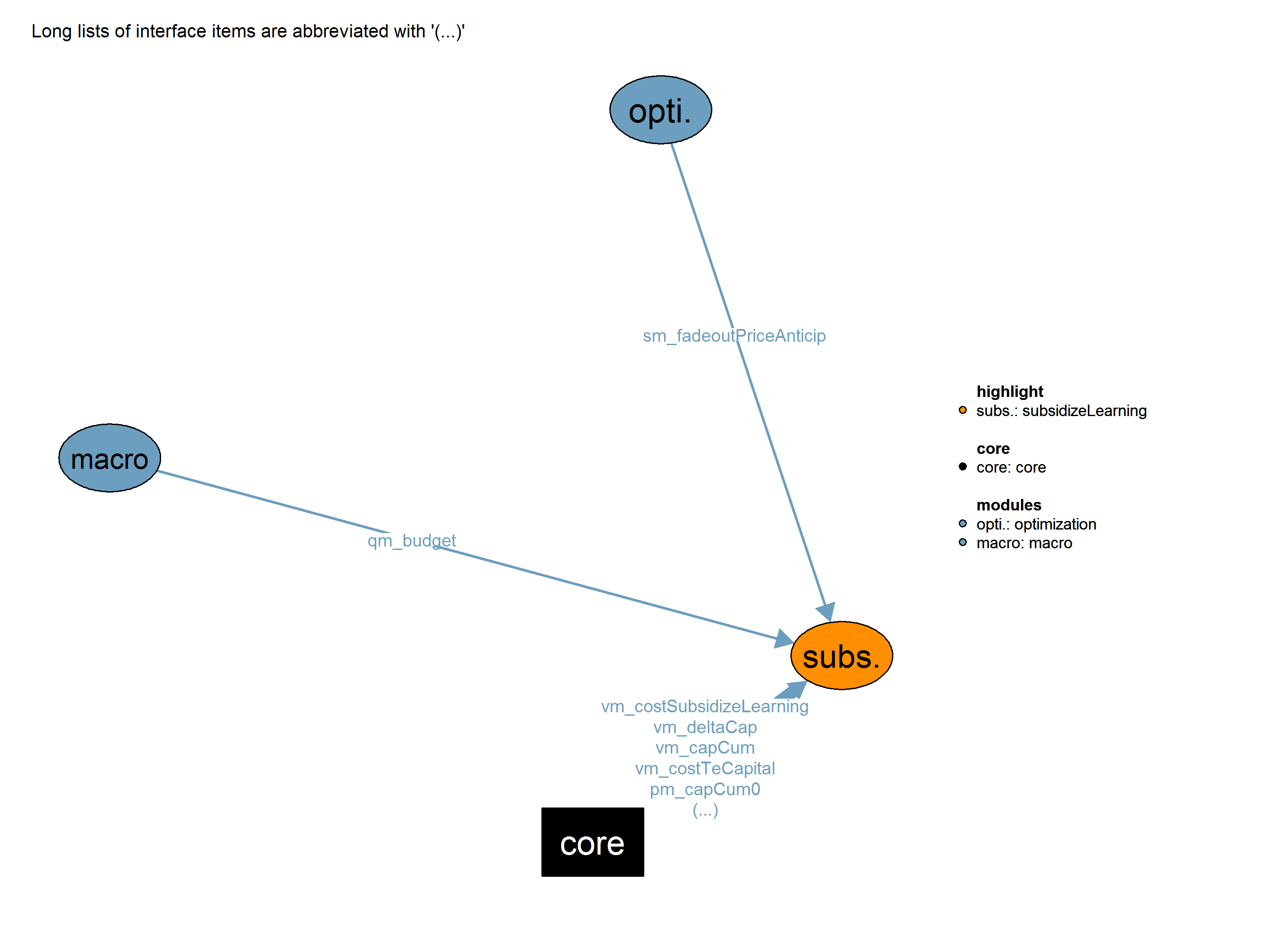
The module computes the level of subsidies for building capacities of learning technologies. Learning spillovers are captured. Yet, based on the level of subsidies, the social benefits of investing into learning technologies are internalized (co-operative solution) or not (non-cooperative solution w.r.t. learning spillovers)

| Description | Unit | A | B | |
|---|---|---|---|---|
| cm_startyear | first optimized modelling time step | \(year\) | x | |
| pm_capCum0 (tall, all_regi, all_te) |
vm_capCum from last iteration | x | ||
| pm_capCumForeign (ttot, all_regi, all_te) |
parameter for learning externality (cumulated capacity of other regions except regi) | x | ||
| pm_SolNonInfes (all_regi) |
model status from last iteration. 1 means status 2 or 7, 0 for all other status codes | x | ||
| pm_ts (tall) |
(t_n+1 - t_n-1)/2 for a timestep t_n | x | ||
| qm_budget (ttot, all_regi) |
Budget balance | x | ||
| qm_deltaCapCumNet (ttot, all_regi, all_te) |
increase of cumulative net capacity | x | ||
| sm_fadeoutPriceAnticip | Helper parameter, describes fadeout of price anticipation during iterations | x | ||
| vm_capCum (tall, all_regi, all_te) |
gross capacities (=capacities cumulated over time) | x | x | |
| vm_costSubsidizeLearning (ttot, all_regi) |
regional cost of subsidy for learning technologies | x | x | |
| vm_costTeCapital (ttot, all_regi, all_te) |
investment costs | x | ||
| vm_deltaCap (tall, all_regi, all_te, rlf) |
capacity additions | x |
This realization is meaningful in order to find the global optimal solution or co-operative solution w.r.t. learning spillovers under the Nash algorithm. For that purpose the optimal subsidy for investing in capacities of learning technologies is computed. The level of optimal subsidy is computed based on the marginal benefits of learning spillovers across all regions (Schultes et al., 2019). Based on this subsidy, regional actors invest in the same way into learning technologies as a global social planner would do, internalizing all external leearning spillover effects.
\[\begin{multline*} vm\_costSubsidizeLearning(ttot,regi) = v22\_costSubsidizeLearningForeign(ttot,regi) \end{multline*}\]
\[\begin{multline*} v22\_costSubsidizeLearningForeign(ttot,regi) = \sum_{teLearn}\left( p22\_subsidyForeign(ttot,regi,teLearn) \cdot \left(vm\_deltaCap(ttot,regi,teLearn,"1") - p22\_deltacap0(ttot,regi,teLearn,"1")\right) \right) \end{multline*}\]
Limitations There are no known limitations.
There is no subsidizing of learning technologies (fixed to zero). Under this realization we get different results from Negishi and Nash solutions. Wheras in the Negishi approach, the social planner internalizes the external effects of investments into learning technologies (co-operative solution), under the Nash approach, the regional actors do not take the benefits for other regions into account when they invest (non-cooperative solution). Still, learning spillovers (based on cumulated installed capacities) occur.
Limitations Within the non-cooperative solution, there is full internalization of learning spillover over times. Furthermore, due to the size of regions, also learning spillovers across countries are partly internalized.
| Description | Unit | A | B | |
|---|---|---|---|---|
| p22_debugInfoCapcum (ttot, all_regi, all_te, iteration) |
debug display helper, not solution relevant | x | ||
| p22_debugInfoCapcumForeign (ttot, all_regi, all_te, iteration) |
debug display helper, not solution relevant | x | ||
| p22_debugInfoInvestcost (ttot, all_regi, all_te, iteration) |
debug display helper, not solution relevant | x | ||
| p22_debugInfoMarginalBudget (ttot, all_regi, all_te, iteration) |
debug display helper, not solution relevant | x | ||
| p22_debugInfoMarginalCapcum (ttot, all_regi, all_te, iteration) |
debug display helper, not solution relevant | x | ||
| p22_debugInfoSubsidy (ttot, all_regi, all_te, iteration) |
debug display helper, not solution relevant | x | ||
| p22_debugInfoSubsidyCost (ttot, all_regi, all_te, iteration) |
debug display helper, not solution relevant | x | ||
| p22_deltacap0 (ttot, all_regi, all_te, rlf) |
deltacapt from later iteration | x | ||
| p22_infoCapcumGlob2050 (all_te) |
info paramter: global capacities in 2050 | x | x | |
| p22_marginalCapcumBenefit (ttot, all_regi, all_te) |
marginal value of capacity addition | x | ||
| p22_subsidy (ttot, all_regi, all_te) |
per unit subsidy - total value | x | ||
| p22_subsidy_LI (ttot, all_regi, all_te) |
p22_subsidy from last iteration | x | ||
| p22_subsidyForeign (ttot, all_regi, all_te) |
per unit subsidy for the foreign spillovers | x | ||
| p22_subsidyForeign_LI (ttot, all_regi, all_te) |
per unit subsidy for the foreign spillovers from last iteration | x | ||
| q22_costSubsidizeLearning (ttot, all_regi) |
Subsidy for learning spillover - total | x | ||
| q22_costSubsidizeLearningForeign (ttot, all_regi) |
Subsidy for learning spillovers in foreign regions | x | ||
| v22_costSubsidizeLearningForeign (ttot, all_regi) |
Subsidy for learning spillover in foreign regions | x |
| description | |
|---|---|
| all_regi | all regions |
| all_te | all energy technologies, including from modules |
| in(all_in) | All inputs and outputs of the CES function |
| iteration | iterator for main (Negishi/Nash) iterations |
| m22_learnteUpdateSub(all_te) | learning technologies |
| modules | all the available modules |
| regi(all_regi) | all regions used in the solution process |
| rlf | cost levels of fossil fuels |
| tall | time index |
| teLearn(all_te) | Learning technologies (investment costs can be reduced) |
| ttot(tall) | time index with spin up |
Anselm Schultes, Marian Leimbach
01_macro, 80_optimization, core